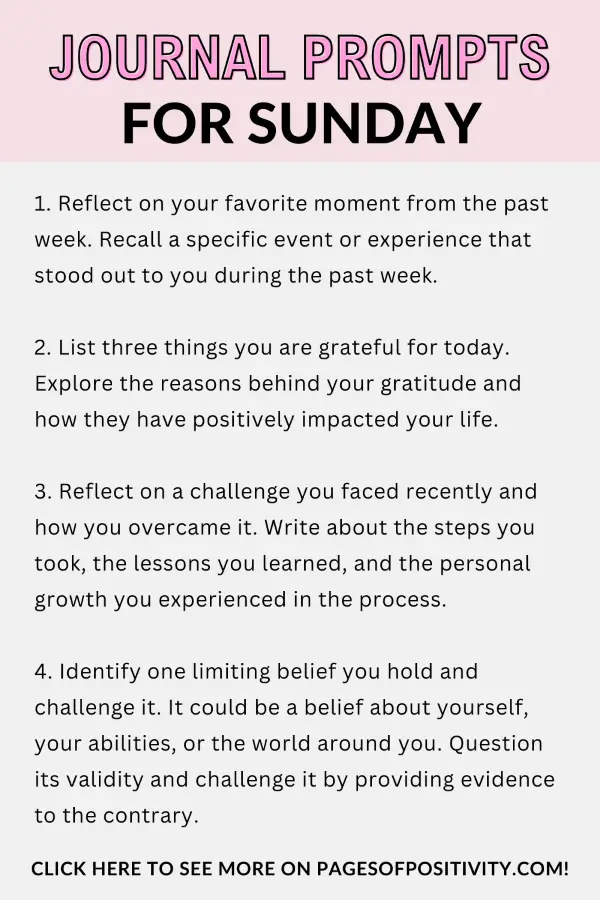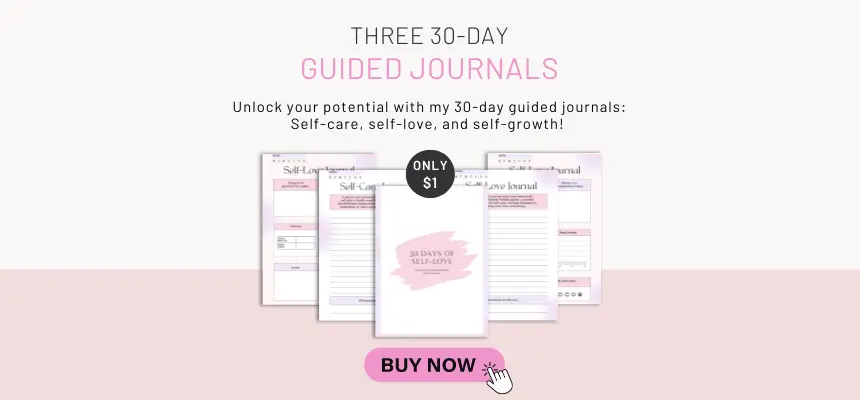Here’s a list of good journal prompts for the end of the week
I’m thrilled to embark on a journey of Sunday journal prompts with you.
Get ready to explore thought-provoking journaling prompts for Sunday that will ignite self-reflection, gratitude, goal-setting, and mindfulness.
Let’s make your Sundays a gateway to personal growth and fulfillment.


This post may contain affiliate links. That is, if you click on a link and buy something I recommend, I will receive a small compensation at no additional cost to you.
30 journal prompts for Sunday
1. Reflect on your favorite moment from the past week
Recall a specific event or experience that stood out to you during the past week.
Dive into the details of what made it special, such as the people involved, the atmosphere, or any unexpected surprises.
Reflect on why this moment brought you joy or happiness, and consider how you can incorporate more of these experiences into your life.
2. List three things you are grateful for today
Explore the reasons behind your gratitude and how they have positively impacted your life. Take a moment to express gratitude for three specific things in your life.
It could be a person, a situation, an achievement, or even something as simple as a warm cup of coffee.
Dive deeper into each item on your list and reflect on why it holds significance for you. Consider the positive impact these things have had on your mental health and how you can cultivate more gratitude in your daily life.
3. Reflect on a challenge you faced recently and how you overcame it
Write about the steps you took, the lessons you learned, and the personal growth you experienced in the process.
Consider how this challenge has shaped you and what strategies you can apply in the future to tackle similar situations.
4. Write a letter to your future self
Imagine yourself in the future—perhaps a year from now or even five years down the line. Write a heartfelt letter to your future self, expressing your hopes, dreams, and aspirations.
Share your current thoughts, feelings, and intentions. Reflect on how far you’ve come since you started journaling and envision the person you want to become.
This exercise allows you to gain clarity on your long-term goals and provides a means of self-reflection when you revisit the letter in the future.
5. Identify one limiting belief you hold and challenge it
It could be a belief about yourself, your abilities, or the world around you. Question its validity and challenge it by providing evidence to the contrary.
Write about alternative perspectives or experiences that contradict this belief. Consider how adopting a more empowering belief could positively impact your life.
6. Describe a place that brings you peace and tranquility
Visualize a location that makes you feel calm, at ease, and connected with yourself. Describe this place in detail, focusing on the sights, sounds, and sensations it evokes.
Reflect on why this place brings you peace. Consider how you can bring elements of that environment into your daily life to create moments of serenity.
7. Write a list of your top priorities for the week ahead
Identify the most important tasks, goals, or intentions you have for the upcoming week. Elaborate on why these priorities are significant to you and how accomplishing them aligns with your long-term vision.
Consider how you can allocate your time and resources to ensure that these priorities receive the attention they deserve.
8. Reflect on a recent act of kindness you witnessed or received
Describe the situation, the people involved, and the impact it had on you. Reflect on how this act of kindness made you feel, and consider ways in which you can pay it forward or cultivate kindness in your own interactions.
9. Write about a lesson you’ve learned from a past mistake and how it has shaped you
Describe the situation, the choices you made, and the consequences that followed. Explore the valuable lesson you learned from this experience and how it has influenced your growth, decision-making, or perspective.
Reflect on how you can apply this lesson moving forward to make wiser choices or avoid similar pitfalls in the future.
10. Write about a book, movie, or song that inspired you recently
Describe the specific book, movie, or song and delve into the elements that resonated with you. Explain how it inspired you, whether it sparked new ideas, emotions, or perspectives, and how you can apply it to your life.
You might also like: Good self-love journal prompts to help you appreciate yourself
11. Reflect on a recent mistake or failure and what you learned from it
Reflect on the specific circumstances, decisions, or actions that led to the outcome. Describe how this experience has contributed to your personal growth and how you can use the lessons learned to navigate future challenges.
12. Describe your ideal Sunday routine
Imagine your perfect Sunday and describe the activities, rituals, and experiences that would make it ideal for you. Paint a vivid picture of how you would spend your day, from morning to evening.
Reflect on why these activities bring you joy, relaxation, or fulfillment. Consider how you can incorporate elements of your ideal Sunday into your actual routine.
13. Write a letter to your past self
Reflect on a significant event or period in your past and write a heartfelt letter to your past self. Offer guidance, reassurance, and advice based on the wisdom and insights you have gained since then.
Share how your experiences have shaped you and provide comfort or encouragement to your past self.
14. Explore a new hobby or activity you’ve been curious about
Research it, learn more about it, and write about why it intrigues you. Consider how you can incorporate this hobby into your life, the benefits it may offer, and the steps you can take to get started.
15. Reflect on a recent accomplishment and celebrate your progress
Describe the process you went through to achieve it and the emotions you experienced along the way. Reflect on what this accomplishment means to you and how it represents your growth and potential.
16. Write a letter of forgiveness, either to yourself or to someone else
Reflect on any past hurts, grudges, or regrets that still weigh on your heart. Write a letter of forgiveness, expressing compassion and understanding.
Release any resentment or self-blame, and seek healing and closure through forgiveness.
17. Describe a place you’ve always wanted to visit
Describe the sights, sounds, and experiences you imagine encountering there. Reflect on what draws you to this place and consider how you can manifest a visit in the future.
18. Reflect on a personal value or principle that is important to you
Identify a core value or principle that guides your life and describe why it holds significance for you. Reflect on how this value has shaped your decisions, actions, and relationships.
Consider how you can continue to honor and live in alignment with this value.
19. Write about a skill or talent you would like to develop further
Describe why this skill is important to you and how it aligns with your personal or professional goals.
Reflect on the steps you can take to learn and practice this skill, and consider the resources or support you may need along the way.
20. Write about a difficult conversation you need to have and how you can approach it with empathy and understanding
Describe the context and the reasons behind the difficulty. Reflect on how you can approach this conversation with empathy, active listening, and open-mindedness.
Consider the desired outcome and strategies to create a safe and constructive dialogue.
You might also like: The best journal prompts to help you process your emotions now
21. Reflect on a recent adventure or spontaneous experience that brought excitement into your life
Describe the experience, the emotions it evoked, and the lessons you learned. Reflect on the importance of embracing spontaneity and seeking new experiences that bring excitement and growth.
22. Write a letter to someone who has positively impacted your life
Describe how this person has impacted you, and share specific instances or qualities that you admire. Consider how you can continue to nurture this meaningful connection.
23. Reflect on a recent self-care practice and its impact on your well-being
Describe the specific activity, how it made you feel, and the benefits you experienced afterward. Reflect on the importance of self-care in your life and consider ways to incorporate more of these practices into your routine.
24. Describe a dream or goal that you have for the future
Describe it in detail, including the specific actions, resources, and milestones involved. Reflect on why this dream or goal is important to you and consider the steps you can take to turn it into a reality.
25. Reflect on a moment when you felt proud of yourself and your accomplishments
Describe the circumstances, the emotions you experienced, and the reasons behind your pride.
Reflect on the personal growth and resilience that led to this moment and how you can continue to cultivate a sense of pride in your life.
You might also like: My favorite journaling prompts to use for stress relief this year
26. Write about a mentor or role model who has inspired you
Describe their qualities, achievements, and the ways in which they have inspired you. Reflect on the lessons you have learned from them and how you can apply their wisdom in your own life.
27. Reflect on a recent boundary you set and how it has positively influenced your well-being
Describe the specific boundary you established and the impact it had on your well-being. Reflect on the importance of setting boundaries for self-care and maintaining healthy relationships.
28. Reflect on a recent moment of gratitude and its impact on your well-being
Describe the circumstances, the emotions you experienced, and the reasons behind your gratitude. Reflect on how practicing gratitude has positively influenced your overall well-being.
Consider ways to cultivate a mindset of gratitude in your daily life.
29. Explore a childhood memory that holds a valuable lesson for you
Describe the details of the memory, the emotions it evokes, and the lessons you have learned from it. Reflect on how this memory has shaped your beliefs, values, or approach to life.
Consider how you can apply these lessons to your present circumstances.
30. Recount a recent experience where you spent time in nature, such as a walk in the park, a hike, or simply sitting in a garden
Describe the sights, sounds, and sensations you experienced and reflect on the impact they had on your well-being
Consider the calming, rejuvenating, or inspiring effects of connecting with nature and how you can incorporate more nature-based experiences into your life.

FAQ: What is journaling?
Journaling is like having a heart-to-heart conversation with yourself on paper. It’s a beautiful practice that allows you to pour out your thoughts, emotions, dreams, and experiences onto the pages of a journal.
It’s a space where you can be completely authentic and explore the depths of your inner world.
Think of your journal as a special friend, a cozy place where you can freely express yourself without worrying what others might say.
It’s like a secret hideaway where you can celebrate your successes, work through tough times, and think about what life has taught you.
Whether you’re using a pen and paper or typing on a computer, keeping a journal is a personal and private way to learn more about yourself.
Let me share a story to show you how amazing journaling can be.
Imagine you’ve had a really long and stressful day.
You feel like there’s a lot on your mind, and you need a way to let it all out. Instead of keeping it all inside, you grab your journal and start writing down your thoughts and feelings.
You write about the tough things you went through, the things that made you frustrated, and the lessons you learned. As you put your emotions on the pages, you start to feel a little better and clearer in your mind.
You start to see things from a different perspective, and suddenly you find solutions to some of your problems. That’s the power of journaling!
You can use journaling in many different ways. It can help you think about yourself and understand what you believe in.
It can also be a place where you write down your goals and dreams. When you write them down, it feels like they become real, and it helps you stay focused on achieving them.
And guess what? Journaling can also help you feel grateful and mindful. It’s a way to take a moment and appreciate all the wonderful things happening in your life right now.
You might also like: The best journal prompts to finally find your purpose in life
FAQ: Why should you journal on a Sunday?
Sundays are those glorious days when time seems to slow down and we can savor the moments before the start of a brand-new week.
It’s the perfect day to embrace the practice of journaling and let its magic infuse your Sunday routine. Why, you ask? Well, let me share some insights with you.
Reflection and closure
Sundays naturally invite us to reflect on the week that has passed. It’s an opportunity to pause, take a step back, and assess our experiences, accomplishments, and challenges.
Intention setting
As we bid farewell to the week behind us, Sundays pave the way for setting intentions for the week ahead. Journaling on a Sunday lets you clarify your goals, desires, and priorities for the upcoming week.
By putting pen to paper, you solidify your intentions, making them more tangible and guiding your actions in the days to come.
Mindful preparation
Sundays are a wonderful opportunity to prepare yourself mentally and emotionally for the week ahead. Journaling on this day helps you cultivate mindfulness and a positive mindset.
By exploring your thoughts, fears, and aspirations, you can identify any areas where you might need extra support or self-care during the upcoming week.
Self-care and relaxation
Sunday journaling can become a cherished self-care ritual, a moment of peace amidst the hustle and bustle of daily life.
Carving out time to journal on Sundays allows you to slow down, reconnect with yourself, and nurture your well-being. It’s like having a personal date with yourself, where you prioritize self-reflection and self-expression.
You might also like: I highly suggest you try these June journal prompts this summer

FAQ: How do you make the most of your Sunday journal practice?
Carve out dedicated time
Set aside a specific time on Sundays that’s solely dedicated to your journaling practice. Treat it as a sacred appointment with yourself.
Whether it’s on Sunday morning, afternoon, or evening, find a time when you can relax and focus without interruptions.
Create a cozy space
Find a cozy spot where you can journal comfortably. It could be a sunny corner of your home, a favorite café, or even a serene outdoor setting.
Surround yourself with items that inspire you, like scented candles, soft pillows, or uplifting artwork. Make it a space that invites creativity and self-reflection.
Set the mood
Enhance your journaling experience by creating a soothing atmosphere. Play some calming music, sip on a cup of herbal tea, or incorporate aromatherapy with organic essential oils.
These little rituals can help you enter a relaxed state and get into the right mindset for journaling.
Start with a moment of stillness
Start your journaling session with a moment of stillness. Close your eyes, take a few deep breaths, and let go of any external distractions.
This brief meditation can help you ground yourself and connect with your inner thoughts and feelings.
Use Sunday journal prompts
Sunday journaling prompts are a fantastic way to kickstart your writing and delve deeper into specific areas of your life.
Choose Sunday journal prompts that resonate with you, such as “What am I grateful for today?” or “What are my top priorities for the week ahead?”
Feel free to get creative and explore different themes like personal growth, relationships, or self-care.
Embrace freewriting
Don’t worry about grammar, spelling, or making everything sound perfect. Embrace freewriting, where you let your thoughts flow without judgment or self-editing.
This allows you to tap into your subconscious mind and uncover hidden insights.
Express yourself authentically
Your journal is a judgment-free zone. Be honest, open, and vulnerable in your writing. Allow your true thoughts and emotions to come to the surface.
Remember, you’re writing for yourself, so let go of any expectations or concerns about how it “should” sound.
Include visuals and mementos
Journaling isn’t limited to words alone. Feel free to incorporate visuals, like photographs, magazine cutouts, or sketches, to improve your journal entries.
You can also include small mementos like ticket stubs, dried flowers, or inspiring quotes. These visual elements can add depth and make your journaling experience more immersive.
Reflect and revisit
Take time to reflect on your past journal entries. Revisit previous entries and observe patterns, insights, and progress.
This reflection can provide valuable self-awareness. It can also help you identify areas of growth and areas where you might need more support.
Embrace flexibility
Remember, your Sunday journal practice is personal and unique to you. Feel free to adapt and modify it to suit your needs and preferences.
Some days you might write pages upon pages, while other days a simple list or a few heartfelt sentences will do.
Allow yourself the freedom to explore and evolve with your journaling practice.
Did you find any good Sunday journal prompts that you’re going to use?

I consider myself an expert when it comes to positive affirmations, journaling, and inspirational quotes. My blog is all about spreading good vibes and helping you feel awesome! I’ve got loads of cool stuff for you to explore, like uplifting affirmations that can boost your confidence, fun journal prompts to spark your creativity, and inspiring quotes to motivate you every day. Let’s embark on this amazing journey together as we discover more about ourselves, uncover our hidden strengths, and create a life that’s full of happiness and success.







